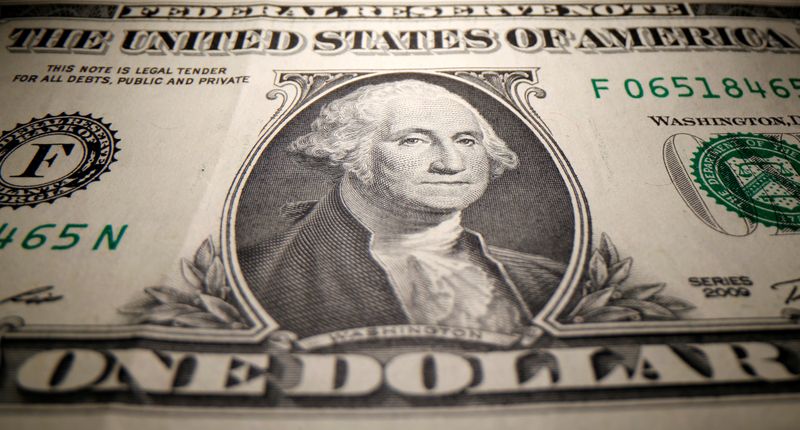By Chuck Mikolajczak
NEW YORK (Reuters) -The dollar index fell to its lowest in more than two months on Monday, continuing a drop from the prior week, as investors largely believe the U.S. Federal Reserve has completed its interest rate hike cycle and look towards when the central bank may start to cut rates.
The dollar index hit a low of 103.37, its weakest level since Sept. 1, after a tumble of nearly 2% last week, which marked the biggest weekly percentage drop since mid-July.
Markets have priced out any additional Fed rate hikes, as recent data has shown a slowing of the economy and inflation pressures – but not enough to increase fears a sharp recession is looming.
On Monday, the Conference Board’s October leading economic indicator showed a decline of 0.8%, slightly below the estimate calling for a 0.7% decrease and its 19th straight monthly fall.
The economic calendar is relatively light due to the shortened work week in the U.S. with the Thanksgiving Day holiday on Thursday.
Markets are now attempting to determine when the Fed may begin to cut rates and are currently pricing in a greater than 50% chance of a cut of at least 25 basis points by May, according to CME’s FedWatch Tool.
“The market is convinced, both credit, equities and currencies that the Fed has finished raising rates, but the Fed is not willing to say so. We all know this, we’ve seen this before, we’ve heard it before,” said Joseph Trevisani, senior analyst at FXStreet.com.
“So you’re getting a gradual weakening in the dollar, simply because the Fed is doing its best to prop up rates, not necessarily the dollar, but to prop up rates.”
Recent comments from some Fed officials have not ruled out the possibility more rate hikes could be needed should a change in economic data require it.
On Monday, Richmond Federal Reserve president Thomas Barkin said inflation is likely to remain “stubborn” and force the central bank to keep interest rates higher for longer than investors currently anticipate.
In addition, minutes from the Fed’s latest meeting are scheduled to be released on Tuesday, and investors will parse comments for any signals on the central bank’s policy path.
Against the softer greenback, the euro hit its highest since Aug. 15 at $1.0952, while the yen firmed to a 6-1/2 week high of 148.09 per dollar. Against the yen the dollar was last traded at 148.36 yen , down 0.84%.
The euro has been strengthening on expectations the European Central Bank (ECB) is operating with a lag to the Fed, and will keep its rate hike cycle intact after the Fed has finished.
In addition, Moody’s (NYSE:MCO) unexpectedly upgraded the outlook on Italy’s ‘Baa3’ sovereign rating to stable from negative and upgraded Portugal’s rating by two notches to ‘A3’.
Sterling traded at $1.251, up 0.36% on the day, after reaching a two-month high of $1.2518.



